- Home
- Anders de la Motte
Rites of Spring Page 27
Rites of Spring Read online
Page 27
‘Is this surgery funded by the Bokelund Foundation?’
‘Yes – why?’
‘No reason – I was just curious. The foundation seems to be involved in most things around here, big and small. I believe your mother-in-law is the chair?’
A statement framed as a question. She doesn’t answer.
‘We have an information meeting in the community hall tomorrow evening. Why don’t you come along? Who knows, we might even be able to convert you, Doctor.’
He smiles apologetically as if he’s regretting his behaviour.
‘By the way . . .’ He reaches into his pocket and takes out an object which he places on the desk. ‘This was on your windscreen in the car park. I noticed it on passing and I was curious. What is it?’
Thea freezes.
It’s a Green Man figure, more or less identical to the one that was on her car after she’d been to Svartgården.
‘Are you OK?’ Philippe says. ‘You’ve gone very pale.’
‘I’m fine,’ she murmurs, unable to take her eyes off the little figure.
65
T
hea heads home just after four. Walks around the car before she gets in, carefully checks out the car park. She scrutinises every vehicle she meets on the drive back to the coach house; the steering wheel feels sticky against her palms.
She’s been given another warning. Someone knows she hasn’t listened, that she’s carried on digging into the story of the spring sacrifice.
There’s a group of people chatting on a corner; she thinks they fall silent and stare after her as she passes by. The GPS flashes and she is reminded that Dr Andersson told her the digital driving log is somehow linked to the foundation. Can they trace her movements? Is that how someone knew she’d parked by the old entrance to Svartgården? Have they tracked her journey to see Ronny, and her father in prison?
The thought turns her blood to ice.
Who has access to the log? Dr Andersson? Erik Nyberg, the foundation’s treasurer? Her own mother-in-law?
*
As she approaches the castle she sees Per Nyberg’s pick-up in front of the main entrance, next to her in-laws’ car. Per and Erik are with Nettan, David and his parents.
She pulls up and goes over to them. Ingrid’s hand is tucked under Bertil’s arm. He looks bright, and is clearly having a good day.
‘Hi Thea – we were just talking about you,’ Per says.
‘Oh yes?’
‘David and Ingrid were telling us that you’d been through some tough times in Syria. That you’d lost a close friend.’
Thea tries not to glare at David. He’s got no right to bring that up, especially not in front of a group of people, as if her trauma were some kind of entertainment. She’s definitely not in the mood for this conversation, and she doesn’t like hearing that they were talking about her.
‘It must be nice to come to a quiet place like Tornaby – nothing ever happens here,’ Nettan pipes up, contradicting everything she said the other night.
Thea’s irritation spills over.
‘Really?’ She raises her eyebrows. ‘What about ritual murder, a ghostly rider and a missing family?’
Per frowns, Nettan’s expression is hard to interpret, and both David and his mother look furious. Only Erik Nyberg and Bertil seem unconcerned.
At that moment they hear footsteps on the gravel and Hubert comes round the corner. He looks surprised, and seems to be considering whether to go back the way he came.
‘Hubert!’ Bertil calls out, a little too loudly. ‘It’s been a long time – how’s your father?’
Hubert comes over, greets everyone with a nod.
‘Rudolf’s been dead for many years – you know that,’ Ingrid says, tugging at her husband’s arm.
‘Of course I do,’ he says crossly. ‘I was the one who helped him with . . .’ He falls silent.
‘The foundation,’ Ingrid supplies. ‘You helped Rudolf to set up the Bokelund Foundation, for which we’re all very grateful, aren’t we?’
A collective murmur of agreement.
‘Except for Hubert,’ Thea points out.
The murmur stops abruptly, but she sees one corner of Hubert’s mouth turn up in a wry little smile directed at her.
*
‘What the fuck was that all about?’ David says as soon as they’re alone. ‘Ritual murder, the foundation, Hubert . . . Why the fuck did you say all that?’
‘Why are you running around telling people about Syria? And Margaux?’
‘I . . . I just want people to realise what you’ve been through.’
‘Why?’
‘I don’t know. Because I want to help you.’
‘By babbling on about what happened to me?’
‘That’s not what I meant.’
‘You’ve helped me enough, David. I’m fine now, OK?’
‘You’re not though, are you? It’s barely been a year. The psychologist said . . .’
‘Fuck the psychologist. I don’t need any help – not in that way.’
She’s angry, furious, without really knowing why. David looks exhausted.
She takes a deep breath, makes an effort to soften her tone.
‘I’m eternally grateful for everything you’ve done for me, but I can’t be a victim all my life. I have to try to move on. Besides which, you’ve got other things to think about.’
He nods, manages a little smile.
He prefers you like that, Margaux whispers from nowhere. Broken, cowed . . .
Thea presses her lips together hard in order to shut her up.
66
‘This puzzle gives me no peace, Margaux. I have to find answers to my questions. For my own sake. Who killed Elita Svart? What happened to her family? And who’s watching me?’
T
he atmosphere is still a little strained at the breakfast table, but at least it’s better than yesterday.
David is making an effort not to check his phone every thirty seconds, and Thea is doing her best to show an interest in the preview dinner.
‘Two days to go until Walpurgis Night,’ she says. ‘How many of us will there be?’
‘About fifty.’
‘So many?’
‘Yes, I’ve got people coming from the restaurant industry, a few journalists, then others it’s useful to have on side – wedding and party planners, influencers and so on. It’s important that we get off to a good start.’
He’s attempting to sound relaxed, but he can’t fool Thea.
‘Fantastic,’ she says, trying to shut out the sound of her father’s voice.
One well-aimed Facebook post is all it would take.
She thinks about the conversation with Sebastian. Wonders whether to leave it, or whether it’s better to tackle the issue now.
‘Sebastian came to see me yesterday. He and Nettan are worried about the finances.’
David stiffens. ‘He’s spoken to you?’
‘Yes, but with the best of intentions,’ she adds unnecessarily.
David shakes his head, and Thea already regrets bringing up the subject.
‘Those two have no fucking clue about anything. Never have, never will.’
He knocks back the rest of his coffee and stands up.
‘Don’t worry, Thea. I’ve got everything under control. It’s going to be a fantastic evening, and afterwards nobody will be whining about money anymore.’
He manages a rigid smile, kisses her and heads out of the door.
*
Thea takes Emee for a walk. She looks for Hubert, but his car isn’t in its usual place, so she assumes he isn’t home.
She crosses the bridge to the forest. It’s rained overnight, everything is wet. The birds are singing for all they’re worth. From time to time the sun peeps out from between the clouds, and she should be full of the joys of spring, but there’s too much going on in her head. She has to forget about Elita Svart and about whoever is watching her and conce
ntrate on a more pressing problem, one that threatens not only her, but also David and their entire future.
It’s only a matter of time before her father contacts her again, threatens her again. She even gave him her phone number.
After all these years, she’s on the point of being sucked back into his universe. Is she really going to write a petition for his reprieve? After all, there is a reason why he’s in jail. The people who’ve fallen victim to his crimes, not to mention Ronny and herself. What would have happened if she hadn’t taken Mum’s money and run? She would probably have been dead, sitting in that car with Jocke when he tried to get away from the police. Or behind bars, because she’d already been involved in her father’s ‘business affairs’ back then.
He must have been terrified when she disappeared. Wondered if she’d gone to the police. If she was intending to tell them everything she knew, as Lasse had done with Leo.
She has reached the Gallows Oak. The lightning strike doesn’t seem to have killed it; the leaves have unfurled beautifully, but the face looks even more alarming, with the fresh scar running down the trunk. It is staring almost accusingly at her, as if the strike was somehow her fault.
She keeps going, follows the path all the way to the point where the canal separates the forest from the marsh. She stops from time to time to make sure she really is alone.
In spite of her efforts, the thoughts come crowding in. It’s all such a mess, but she can’t let go of Elita’s fate now; she’s come too far.
Suddenly she realises that she’s made a rookie error. She’s been in too much of a hurry, allowed herself to be distracted by the sheer number of pieces in the puzzle instead of starting at one corner and methodically working her way forward.
So, what are her corners? What does she know for certain? Somehow she suspects that the key is the child Elita was carrying, so she ought to start there. Try to find out who altered the autopsy report, and why it was so important to hide Elita’s pregnancy.
Lennartson, the chief of police, is a prime candidate. He led the investigation, and must have had the opportunity to appropriate the autopsy report, and to make sure there was no further contact between the forensic pathologist and the other officers on the case.
But why would Lennartson have done that? On whose instructions?
Lennartson is dead, so there’s really only one person who can help her with that line of inquiry.
The same man who threatened to beat up Kurt Bexell if he didn’t stop asking awkward questions.
Uncle Arne.
*
Thea pushes the case file into her bag, settles Emee in the car, then drives to Tornaby and on to Ljungslöv. Once again she passes the effigy of the Green Man on the bonfire on the common.
References to the Green Man recur throughout the investigation. The Green Man took her – that’s what Lola said in her interview. The children saw him ride into the glade.
Elita had packed her suitcase. The time for her metamorphosis had arrived. The Green Man was supposed to collect her, and frighten the children away at the same time. The stories fit together up to that point – but what went wrong?
If Leo wasn’t the Green Man, then who was?
She switches on the car radio, finds a station playing Eighties hits. Duran Duran, ‘A View to a Kill’. She thinks of the poster in Elita’s room, imagines her miming to this very song in front of the mirror, and she realises that something else doesn’t make sense. Something to do with music, Svartgården, and the children’s testimony.
She pulls over by a bus stop and takes out her phone. Scrolls through the photographs she took in Elita’s room. Her clothes, the contents of her desk, the biology textbook, the cassettes labelled in someone else’s handwriting. Cassettes, but no tape player. She consults the case file, turning first to the interviews with the children, then to the list of items held as evidence.
The children say that they’d recorded drumming and a rhyme on Elita’s tape machine, and that the same machine was there in the stone circle.
But no tape player was found at the scene of the crime. Nor were the animal masks from the Polaroid. The children said they dropped the masks in the forest as they ran away, but no masks are listed among the evidence from the scene.
Why not? Maybe Arne can help to answer those questions too.
*
The police station in Ljungslöv is housed in a red-brick building opposite the bus and train station. Reception is open only one day a week, and the door is locked. Thea presses the intercom button.
‘Police,’ says a female voice.
‘Hi, my name is Thea Lind. I’d like to speak to Arne Backe.’
A brief silence, then a buzzing sound as the door is unlocked.
Thea hesitates for a second. Is this a good idea? But Ingrid told her to speak to Arne if she had any more questions, which she does. And surely she’ll be safe inside the police station?
A female officer meets her in the foyer. She can’t be more than twenty-five, yet she already has the slightly weary look of someone who has seen too much of the worst aspects of humanity.
‘Arne’s not on duty today,’ she says rather brusquely.
‘Oh, that’s a shame.’ Thea realises she should have called first to check.
‘Is that your car?’ The officer nods in the direction of the easily recognisable vehicle, with the name of the local car dealer emblazoned on the side.
‘Yes.’
‘Oh, so you’re the one who lives at Bokelund castle. You’re married to Arne’s nephew. You’re opening a restaurant – Arne talks about it all the time.’
‘That’s right.’ This information surprises Thea.
‘He only lives around the corner, if it was something important you wanted?’
‘Does he?’
‘Algatan 14. It’s no more than five minutes’ drive. I’ll show you.’
67
A
rne’s house is a large white bungalow with a double garage. A robot mower is buzzing around the lawn. The BMW in which he picked up her and Bertil is parked on the drive, next to another that is almost identical.
She still isn’t sure whether this is a good idea. Calling in to see Arne at the station is one thing, but seeking him out at home is another. A lot more risky. On the other hand, she doesn’t think she can get much further without his help. After all, they’re family, and she’s here now.
She gets out of the car and rings the doorbell. A grey tabby cat appears from nowhere and starts rubbing around her legs. It slips inside as soon as Arne opens the door.
He’s in his pyjamas and dressing gown. Square reading glasses perched on the end of his nose.
‘Thea, what a nice surprise,’ he says, sounding as if he means it. ‘Come on in – would you like a coffee?’
He steps aside to let her in. She hangs up her jacket; it occurs to her that she knows very little about Arne, except that he’s a police officer, was more or less brought up by Ingrid and Bertil, and used to be married to a woman from Thailand. Apparently, he’s a cat person too, which surprises her.
The house is clean and tidy. The oil paintings on the walls look as if they were bought on holiday overseas – paddy fields, sunsets, bamboo forests. Asian kitsch.
‘Nice artwork,’ she says as he shows her into the kitchen.
‘My wife’s. Ex-wife’s, I mean.’
He nods towards a photograph. He is about ten years younger, standing beside a small woman dressed in white, wearing a little too much make-up. She’s holding a bridal bouquet and smiling stiffly at the camera. Arne looks considerably more cheerful.
‘Sweden was too cold for her. Take a seat,’ he says, pointing to a kitchen chair before going over to a cupboard and getting out coffee cups. She sees him quickly hide a bottle of schnapps.
The kitchen smells of coffee and toast. There are several photographs on the walls, probably taken in Thailand. Arne and the woman again, often with a child – a boy aged about ten.
‘Sammy,’ Arne says when he sees her looking. ‘My stepson. We’re still in touch; I’m going to visit them in a couple of weeks. I try to get over there at least once a year.’
‘Lovely.’
‘Milk and sugar?’
‘Please.’
He passes her a cup and brings out half a sponge cake, which she assumed he baked himself.
‘It was your colleague who gave me your address.’
‘Which one? There are four of us at the station.’
‘A young woman.’
‘Jönsson. Of course, it’s Wednesday today.’ He shakes his head. ‘Ljungslöv used to have a real police station, fully staffed, and a patrol car that was out and about twenty-four/seven.’ He takes a sip of coffee as if to wash away the bitterness in his voice. ‘So to what do I owe the honour, Thea?’
‘I have some questions about Elita Svart. I know it’s all a bit sensitive, but Ingrid said you’d be able to help me.’
Arne raises his eyebrows. ‘No problem. What do you want to know?’
‘Were you involved in the investigation?’
He leans back on his chair, takes a moment to compose himself.
‘Yes and no. I was pretty new to the job back then; I’d only qualified a few months earlier. The district CID team took on the case, but because I was from Tornaby, I got to help out – drive them around, explain who was who in the village, keep an eye on cordoned-off areas and so on.’
‘Were you present at the interviews?’
‘No. I didn’t have enough experience, but of course I heard all about it afterwards. Lennartson, the chief of police back then, held daily briefings where everyone was brought up to date. It was a big thing, a local murder. The first and only one in all the years I’ve worked here.’
Arne is being much more helpful than Thea had expected. He’s nowhere near as cautious or reticent as everyone else she’s spoken to. She regrets not turning to him earlier, and tries to curb her enthusiasm.
‘Who interviewed Leo?’
‘Two colleagues from CID. One of them was called Bure, but I’ve forgotten the name of the other one. They were good, though.’ Arne looks amused, as if he’s trying to work out where she’s going with this.

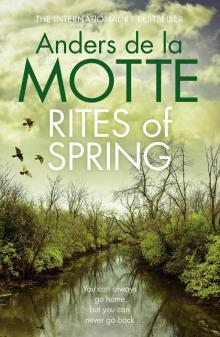 Rites of Spring
Rites of Spring Game: A Thriller
Game: A Thriller End of Summer
End of Summer Buzz: A Thriller
Buzz: A Thriller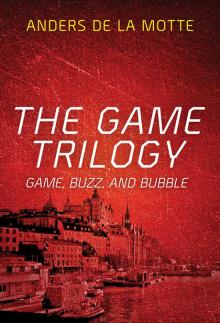 The Game Trilogy
The Game Trilogy Bubble: A Thriller
Bubble: A Thriller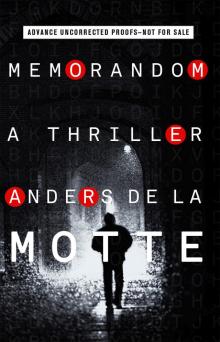 MemoRandom
MemoRandom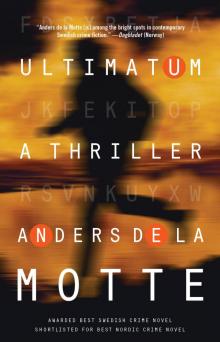 Ultimatum
Ultimatum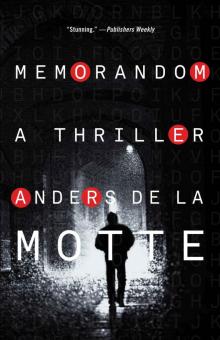 MemoRandom: A Thriller
MemoRandom: A Thriller